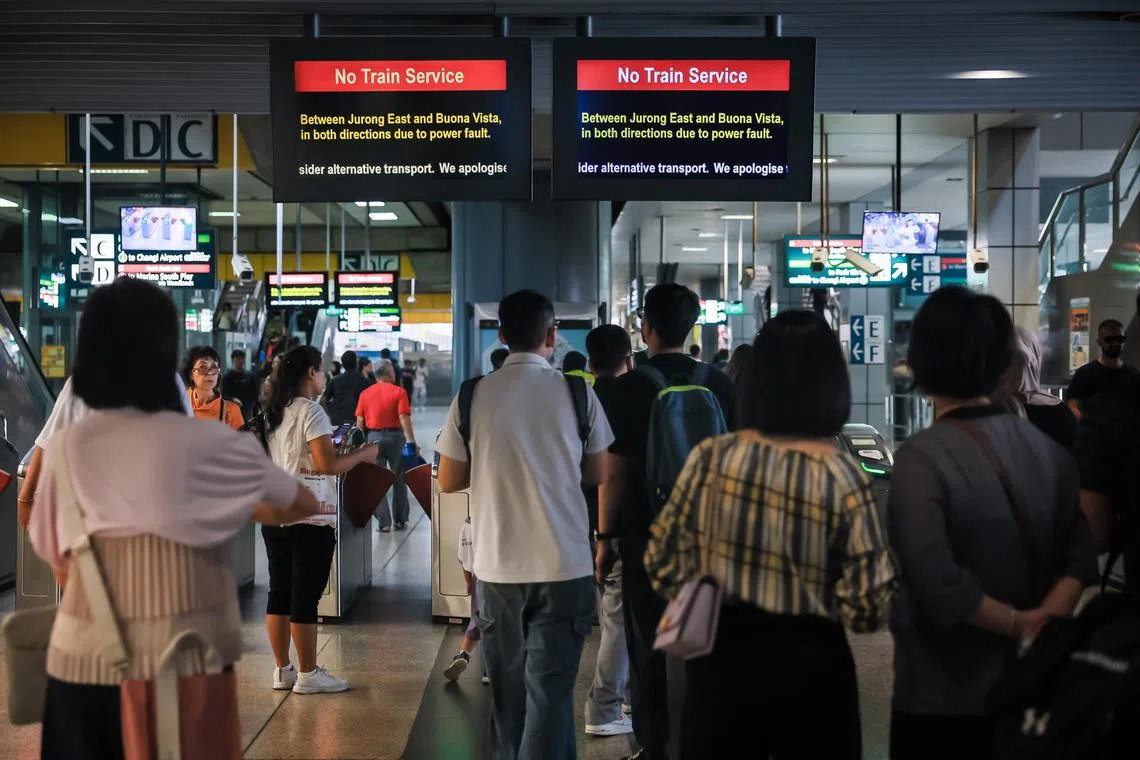LTA starts probe into EWL train disruption, will appoint expert panel to review findings
Sign up now: Get ST's newsletters delivered to your inbox

The disruption to East-West Line MRT services affected more than 2.1 million passengers over six days.
ST PHOTO: GAVIN FOO
SINGAPORE – The Land Transport Authority (LTA) has begun investigations into a major six-day disruption to train services between Jurong East and Buona Vista MRT stations on the East-West Line (EWL).
The probe will cover areas such as the root cause of a component falling off a train’s undercarriage that triggered the severe disruption from Sept 25 to 30, as well as fault detection procedures and service recovery efforts.
The investigations are expected to be completed in a few months, and the findings will be made public, the authority said on Oct 2.
LTA said it will also appoint an expert advisory panel to review the findings and give technical advice.
Affecting about 2.6 million passengers over six days, the EWL disruption is one of the worst in the 37-year history of Singapore’s MRT system.
As part of its probe, LTA will look into the root cause of why an axle box – a component on a train’s undercarriage – fell off the faulty train,
Second, it will examine the fault detection and incident handling procedures to find out if appropriate actions were taken.
It will do so by reviewing current procedures, and it will propose measures to improve the detection of such faults, minimise disruptions to services and prevent damage to rail infrastructure.
Third, LTA will review the service recovery efforts, as well as mitigating measures during the disruption, to determine if the responses taken by rail operator SMRT were fast and comprehensive enough.
These include the speed of the roll-out of bridging bus services that ferried passengers between affected stations and the effectiveness of announcements on the disruption.
It will also look at the clarity of guidance given to commuters on other travel options such as bridging bus and shuttle train services, as well as overall crowd management.
In the wake of the incident, there were calls from some quarters – including the Progress Singapore Party – to convene a Committee of Inquiry (COI).
Asked why a COI was not convened, a Ministry of Transport (MOT) spokesman noted that the severity of the EWL disruption was due to a train causing extensive damage to the track and trackside equipment. LTA, as the rail regulator, has the “necessary regulatory powers and technical knowledge” to conduct a thorough investigation, the spokesman said.
He added that LTA will be supported by an expert advisory panel to supplement its investigations.
In December 2011, then Prime Minister Lee Hsien Loong ordered a COI after two severe disruptions on the North-South Line.
The expert panel to be appointed by LTA will be chaired by Mr Malcolm Dobell, the former head of train systems at the London Underground, who has more than 45 years of experience in rail operations and maintenance.
Also on the panel are five other experts from Singapore and abroad. They include Dr Tony Lee, operations and innovation director at Hong Kong public transport operator MTR Corporation, and Mr Chen Chao, deputy general manager of the vehicle branch at Shanghai Shentong Metro Group.
The other members are Mr Chew Tai Chong, director and global rail leader at consultancy Arup in Britain; Associate Professor Gan Hiong Yap, a maintenance engineering expert from the Singapore Institute of Technology; and Professor Manoj Gupta, a materials science expert at the National University of Singapore (NUS) with a mechanical engineering background.
“As part of the investigations, LTA will gather the facts, interview staff involved, review records and evidence, and consult with the expert advisory panel,” the authority added.
Separately, MOT said on Oct 2 that its Transport Safety Investigation Bureau will also carry out an independent safety investigation into the disruption. In a Facebook post, Transport Minister Chee Hong Tat said the recent disruption affected many passengers and caused substantial damage to rail infrastructure. LTA will carry out a thorough investigation to ascertain what happened and identify areas for improvement, he added on Oct 2.
SMRT said its board has also established a committee to review the incident.
It will be chaired by Mr Quek Gim Pew, who sits on SMRT’s board and was chief defence scientist at the Ministry of Defence. Mr Ng Chin Hwee, another SMRT board member and the former chief executive of the SIA Engineering Company, will be its deputy chairman.
The committee will also include independent members, such as Associate Professor Zeng Kaiyang from the NUS department of mechanical engineering and Dr Koh Yong Khiang, adjunct fellow at the Singapore University of Technology and Design (SUTD), who specialises in the structural dynamics and vibration control of mechanical systems.
Also on the committee are Mr Patrick Ky, chief executive of the International Centre for Aviation Innovation; Mr Teo Chin Hock, former deputy chief executive for strategic development at the Defence Science and Technology Agency; and Professor Lim Seh Chun, acting provost at SUTD.
The EWL disruption was triggered by a faulty first-generation Kawasaki Heavy Industries train, which had been in service for more than 35 years. The train suffered a fault near Clementi station at about 9am on Sept 25.
While it was being withdrawn from service to Ulu Pandan Depot, an axle box dropped onto the tracks near Dover station. Axles connect the wheels of a train. This caused the wheels of the undercarriage to derail, damaging the tracks and trackside equipment over a 2.55km stretch.
As a result, extensive repairs and replacement works had to be done, followed by tests of the tracks and trackside equipment to ensure passenger safety, before services were restored on Oct 1.
Editor’s note: This story has been updated with the latest number of passengers affected by the train disruption, and names of the members in the committee set up by SMRT.


